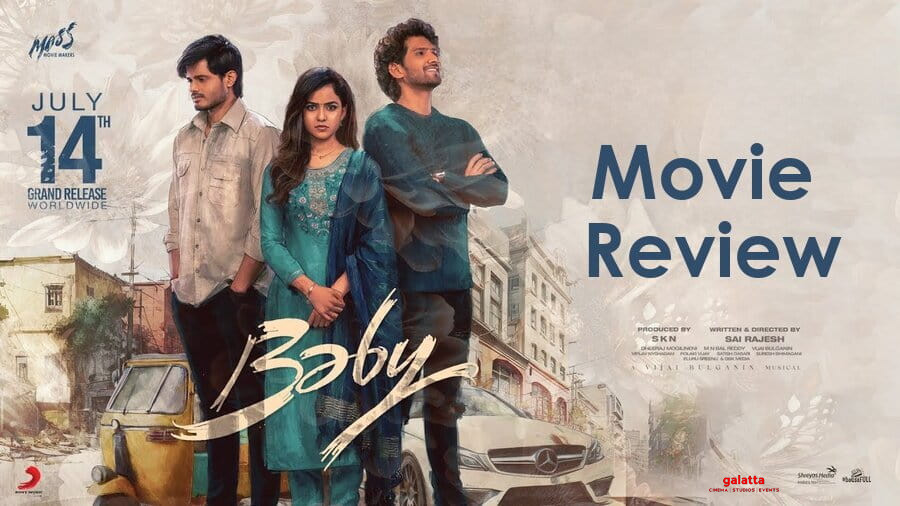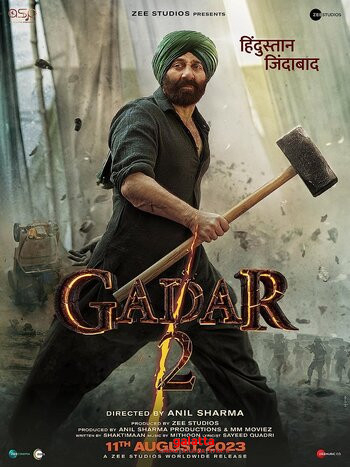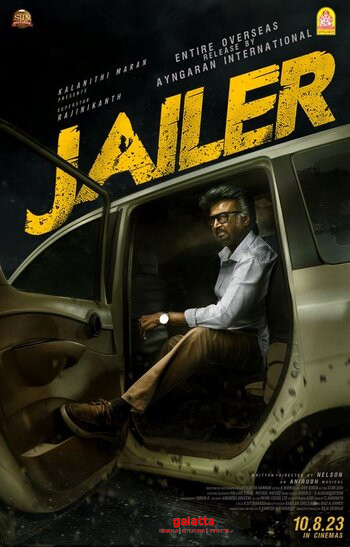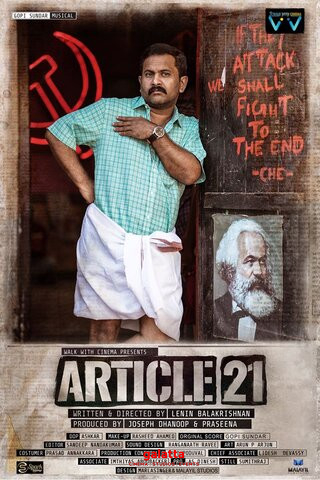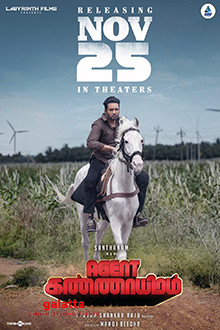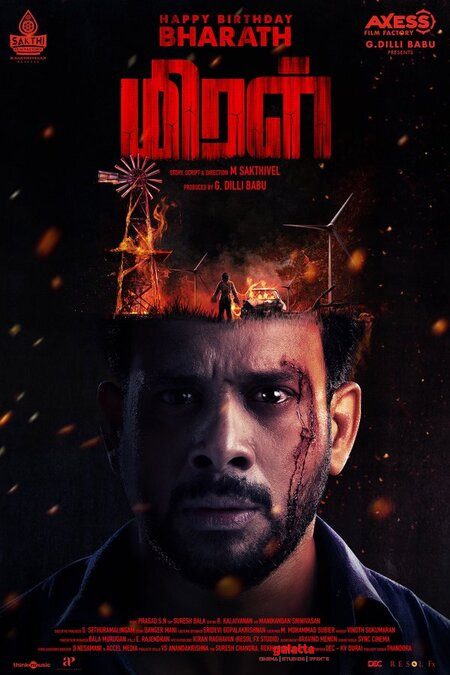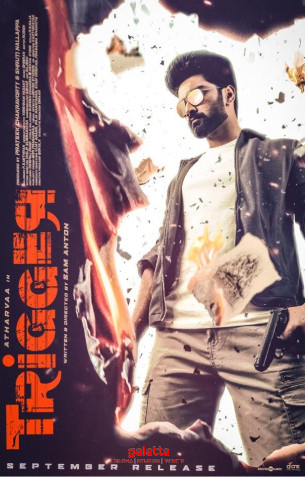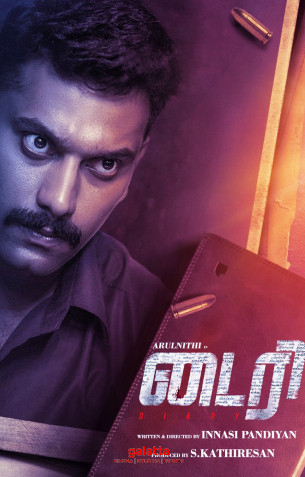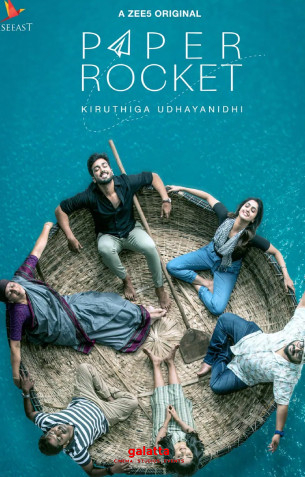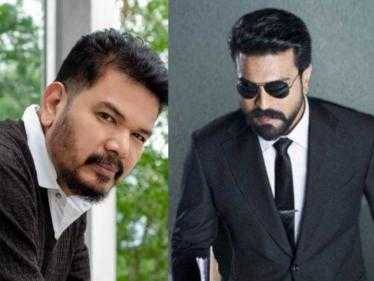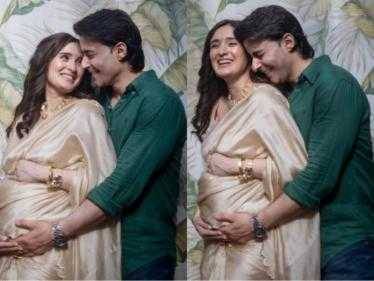Baby Movie Cast & Crew
So this is the scenario. Let’s say we fall hard for someone in school, someone from the same lower-class neighbourhood that we live in. Because that is our world. That is all we know. Then, we get admission to a posh college in a posh part of the city, and our world expands. It's not that we reject our roots, but we are just too seduced by the glitter and glamour of an aspirational lifestyle. One part of us stays true to the love from the old neighbourhood, but when a rich and attractive person shows interest, there is a small reciprocation (maybe a what-if) there, too. The three characters that play out this scenario in Sai Rajesh's Baby are an auto driver named Anand, a college-goer named Vaishnavi, and her classmate Viraj. (The actors are Anand Deverakonda, Vaishnavi Chaitanya, and Viraj Ashwin.) The film is a sort-of love triangle, but more importantly – and interestingly – it is about growing-up pains. These late-teen/early twenties characters are not yet fully formed, so we cannot call them "flawed". Baby is about the idiotic things we do, the idiotic mistakes we make at that age.
The film is also about how peer pressure, the desire to belong to the cool group in college, can warp our values. The film is also about class, about how two men arrested for the same crime are treated differently in jail. The film is also about how easily men can slut-shame women, by calling them a whore, while there's no equivalent term for women to throw back at men. The film is also about a man who wants to settle easily for one kind of love versus a woman who has begun to see love in other ways. The thoughts are layered, and the filmmaking keeps up. In another story, we'd think that Vaishnavi is being insensitive when she mocks the cheap smart-phone that Anand got her, by mortgaging his auto – but here, the act becomes a sign of how she has begun to be seduced by people with iPhones. And yet, in just a few minutes, the scale tips, and we see Anand being equally insensitive. In desperation and anger, he tells Vaishnavi: "Your life has no meaning without my love." Both of them are making their own mistakes, inflicting their own wounds, fumbling through life in the process of growing up and finding themselves.
The beauty of Baby is that it does not judge anyone. Imagine a man who has never been slapped, not even by his mother. Now imagine this man being beaten up by a moneylender's goons. And imagine him having to hear his girl say things that make him feel she may be moving away from him. Of course he is going to erupt like a volcano and say things in the heat of the moment. Now imagine a woman who has been slut-shamed by her boyfriend and is then being courted by a very decent man. Of course she is going to want to hurt the boyfriend the way he hurt her. Now imagine the third character, a man who is constantly being given mixed signals by the woman he loves. Of course he is going to resort to manipulative means in order to get her. Every action is justified because these characters are human beings and therefore imperfect. The interval point is a marvel of entirely justified cruelty.
One of the nicest things about Sai Rajesh’s writing is the way it takes us back to Anand and Vaishnavi's schooldays, and shows us how they fell in love. Actually, she was obsessed with him. He barely registers her presence. And then, during Raksha Bandhan, she refuses to tie a rakhi on him, as their teacher orders – and she gets caned. That's when he falls for her. That's when he asks if he can love her. She doesn't smile immediately. She hesitates, as though processing her thoughts, and then she smiles. Processing one's thoughts (often through dialogue) is what Baby is about. And look at the trigger that makes Anand reciprocate Vaishnavi’s emotions. It is the fact that she is willing to be caned for him. Read one way, his ego is inflated by this act, which possibly makes him feel special in a way he never has earlier. She has "proved" her feelings in public. No wonder the topic of his ego comes up later.
Another spectacular scene has Vaishnavi on a moralistic high horse, trying to get out of a kinda-sorta relationship. She returns all the gifts the man has given her. She thinks she has the upper hand – and then the man shows a mirror to her by showing her a video. The content of the video is not important. What’s important is the realisation that Vaishnavi is no better than this man. It's hard not to feel for these three lives, swept along by the flow of life, the flow of hormones, and by the flow of emotions. We see this again in the scene where Vaishnavi uses Anand and his auto to take her someplace. It is a brilliantly painful stretch, and it might make some audiences think back about the stupid and confused things they've done at this stage of life.There is a moral that follows, and it comes from hard-earned wisdom: You can cheat others but you cannot cheat yourself. This is Vaishnavi's lowest point, and she has dug her own grave – and again, you don't judge her. Instead, you feel sorry for her.
So at a conceptual level, Baby is brilliant. At the execution level, however, there are things that you wish had been better. For instance, why open the film with a dejected, drunk, Devadas-like Anand and hint at what may lie ahead for the character? Why not surprise us? Why are the supporting characters – Vaishnavi's alcoholic father, her money-minded mother, Anand's mute mother and his friends, the man Anand owes money to, a villainess named Seetha – not integrated more into the narrative? They come and go as they please. They also do what they please, depending on what the screenplay needs from them at that particular point. This is especially jarring in the case of Anand's mother. Their relationship is apparently very complex, but because their bond just skims the surface, a big event at the end does not register as powerfully as it should.
The writing spells everything out, and the result is a very dialogue-heavy movie. At the college, Vaishnavi says she feels something bad is going to happen. Why state this? Why not just let the badness happen? The first time Anand buys Vaishnavi something, she exclaims that she has never received a gift and that she loves cars and big houses. Instantly, we know at least a part of where her arc is taking her. But at the same time, the writing is filled with echoes that round out the characters. So this point about gifts (especially a smart-phone) assumes bigger and bigger proportions, becoming the trigger for some of Vaishnavi's actions. Another echo: Vaishnavi's mother scolds her for dancing on the street, because of what people will say. But later, something far worse happens to Vaishnavi on the street – that is, in public – and this event is witnessed by those very people the mother was concerned about. Another echo: One set of events that have Vaishnavi making a bad decision occurs on Viraj's birthday. A second set of events occurs on Anand's birthday. Another echo: At first, Vaishnavi deflects Anand's requests for physical intimacy. Later, she decides to get intimate, but…
This is the one time the colour red burns through the screen, in the form of a sari. The film shapes Anand's world in cool tones of blue and Vaishnavi's world in earth colours – so when this big red moment happens, it stands out both visually and emotionally. Another standout is Vijay Bulganin's music. The songs are brilliant – and how cool is it to not have a duet between Anand and Vaishnavi in the early stages of their relationship, a “love establishing song”, so to speak. In other words, the positioning of the songs is perfect, especially the heart-rending point where Anand sings of his love for Vaishnavi, from his point of view. The background score is big (after all, this is melodramatic material), and yet, it doesn't crush the delicacy of the scenes.
I wished the screenplay had fleshed out Vaishnavi's feelings for Anand with more detail, given how much in love she was/is with him. In the same vein, I wished for more clarity (even given Vaishnavi's confusions) regarding her actions with Viraj, whose motivations and intentions are not very clear. But as individual characters, there's no denying that Anand and Vaishnavi register strongly. Anand is the typical Romeo, who is strongly influenced by films and has very little complexity – because he is happy where he is, and all he wants is Vaishnavi to complete his life. And she is the opposite. She wants Anand, but she is also attracted to things beyond her means, things she has never seen in her life. Both Anand Deverakonda and Vaishnavi Chaitanya are solid. Anand gets his biggest opportunity yet to showcase a wide emotional range. In the second half, especially, he gets big monologues that he pulls off with the vulnerability of an ordinary man who is not a "hero". My heart broke at one point when Anand hears something and says he is not sure how to react. And Vaishnavi Chaitanya – despite some off-notes – makes a complicated character quite compelling.
Some of the emotional scenes (like the one on a bridge) go on a bit too long, like in the films of the 1990s. But Baby never compromises on the strength of these emotions and never gives up on its core idea that we have to do a whole bunch of foolish things before we end up wherever we do. The film ends with a marriage. Will this person be happy? Who knows! Another character ends up in a sad state of affairs. They will need time to forget, forgive and move on (if they do, indeed, move on). I loved the fact that not everyone in love is shown to have a big heart. Love is often described as divine, but there's no other emotion that can reduce you to a mere human – filled with pettiness and rage and jealousy. With Arjun Reddy, RX 100, and Baby – flaws and all – Telugu cinema seems to have recognised this facet of love the best.
